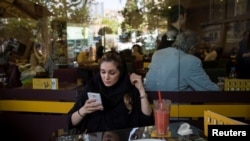Iranian social media users have dismissed a government ban on Telegram, a popular instant messaging service, saying they will use virtual private networks to continue accessing it.
Most Iran-based callers to the Tuesday edition of VOA Persian's Straight Talk call-in show said they already were using VPNs to access Telegram or planned to do so. They said they did not trust Iranian-made messaging apps that the government has been promoting, because they feared authorities would monitor communications on such services.
Iran's judiciary ordered internet service providers to block all access to Telegram on Monday. In a statement, it said authorities wanted to stop "uncontrollable and illegal activity" on the app, which had around 40 million users, accounting for half of the population, according to published reports. The judiciary also cited Telegram's role in helping to mobilize anti-government protests that swept Iran in late December and early January.
Support for ban
One caller to Straight Talk, who identified himself as Qasem, calling from the southwestern province of Khuzestan, said he supported the Telegram ban because of what he said was its use for spreading pornography and immoral content.
But other callers said they relied on Telegram to buy and sell goods. A man who gave his name as Sohrab, calling from the northeastern city of Sabzevar, said Telegram was his only business platform and he did not know what he would do without it.
Some callers expressed concern about the difficulties of using Telegram through VPNs. They said doing so requires paying separate fees and results in slower data processing, making it harder to access news and watch videos of recent protests such as Tuesday's May Day rallies in several parts of Iran.
Iranian President Hassan Rouhani's office released a Tuesday statement indirectly criticizing the judiciary for blocking Telegram, saying issues that concern tens of millions of Iranians "cannot be solely based upon a designation or decision made by judicial authorities."
But the statement made no direct references to Telegram or whether the ban would be lifted. Preserving access to major social media platforms was one of Rouhani's campaign pledges before winning re-election last year.
Behrooz Samadbeygi and Afshar Sigarchi of VOA's Persian service contributed to this report.





